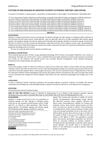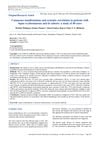 1 citations,
January 2005 in “Side effects of drugs annual”
1 citations,
January 2005 in “Side effects of drugs annual” The document concluded that various dermatological treatments have different effectiveness and side effects, with some causing irritation, allergic reactions, or systemic effects.
 18 citations,
June 2019 in “Clinical research in dermatology”
18 citations,
June 2019 in “Clinical research in dermatology” Acne can't be cured but can be managed with treatments like benzoyl peroxide and diet changes; it's costly and can lead to scarring and mental health issues.
 53 citations,
November 1992 in “Mayo Clinic Proceedings”
53 citations,
November 1992 in “Mayo Clinic Proceedings” HIV can cause unusual and severe skin problems that are hard to treat.

New treatments for vitiligo may focus on protecting melanocyte stem cells from stress and targeting specific pathways involved in the condition.
 4 citations,
April 2020 in “Journal of Cosmetic Dermatology”
4 citations,
April 2020 in “Journal of Cosmetic Dermatology” Low vitamin D levels are linked to different types of hair loss.
 30 citations,
February 2018 in “Journal of Pharmacy and Pharmacology”
30 citations,
February 2018 in “Journal of Pharmacy and Pharmacology” Hedychium spicatum has medicinal properties but needs more research for scientific validation and use.
 June 1930 in “Archives of dermatology”
June 1930 in “Archives of dermatology” Dermatological conditions are complex, and treatments have mixed results.
 1 citations,
July 1976 in “Archives of Dermatology”
1 citations,
July 1976 in “Archives of Dermatology” Some women experienced hair loss after stopping chorionic gonadotropin injections and a low-calorie diet.
 4 citations,
January 2013 in “European Journal of Dermatology”
4 citations,
January 2013 in “European Journal of Dermatology” Epigenetic differences affect hair loss in identical Japanese male twins.
 January 2020 in “Journal of Pharmacognosy and Phytochemistry”
January 2020 in “Journal of Pharmacognosy and Phytochemistry” The VCO-based herbal hair tonic is effective, safe for hair loss treatment, and can be mass-produced.
 July 1976 in “Archives of Dermatology”
July 1976 in “Archives of Dermatology” The document suggests more research is needed to understand skin conditions related to toothpaste and other treatments.
 May 2017 in “InTech eBooks”
May 2017 in “InTech eBooks” Some hair loss disorders cause permanent loss due to scarring, and treatments like steroids don't always work well.
 122 citations,
November 1984 in “Journal of the American Academy of Dermatology”
122 citations,
November 1984 in “Journal of the American Academy of Dermatology” No single treatment is consistently effective for alopecia areata, and more research is needed.
 1 citations,
October 1996 in “Journal of Cutaneous Medicine and Surgery”
1 citations,
October 1996 in “Journal of Cutaneous Medicine and Surgery” Gene therapy shows promise for treating skin disorders and cancer, but faces technical challenges.
 84 citations,
April 2005 in “Dermatologic Clinics”
84 citations,
April 2005 in “Dermatologic Clinics” Treatments for melanin disorders exist, but more effective options needed.
 120 citations,
February 2009 in “Apoptosis”
120 citations,
February 2009 in “Apoptosis” Understanding how cells die in the skin is important for treating skin diseases and preventing hair loss.
 June 2024 in “Al- Anbar Medical Journal”
June 2024 in “Al- Anbar Medical Journal” Acute telogen effluvium can be resolved by addressing causes, but chronic telogen effluvium is harder to treat.
127 citations,
April 1999 in “Journal of Investigative Dermatology” Rodent models helped understand psoriasis but none perfectly replicated the disease.
 July 2021 in “Journal of dermatology research and therapy”
July 2021 in “Journal of dermatology research and therapy” Using combined treatments can help manage acne by targeting the bacteria and skin changes that cause it.
 February 2024 in “Journal of Investigative Dermatology”
February 2024 in “Journal of Investigative Dermatology” Deleting NIPP1 in mouse skin cells causes early aging and chronic skin issues.
 4 citations,
March 2017 in “Journal of evolution of medical and dental sciences”
4 citations,
March 2017 in “Journal of evolution of medical and dental sciences” Older adults often have dry skin and itching, with high blood pressure frequently linked to skin problems.
 January 2012 in “Yearbook of Dermatology and Dermatologic Surgery”
January 2012 in “Yearbook of Dermatology and Dermatologic Surgery” Iron deficiency is not more common in women with hair loss, and neurogenic rosacea may need different treatment.
 32 citations,
April 2000 in “Dermatologic Clinics”
32 citations,
April 2000 in “Dermatologic Clinics” Skin diseases, especially psoriasis, greatly affect people's quality of life, similar to chronic diseases.
 August 2018 in “International Journal of Research in Dermatology”
August 2018 in “International Journal of Research in Dermatology” Skin issues like hair loss, rash, and sensitivity to sunlight are key signs of lupus activity.
 July 2022 in “The journal of investigative dermatology/Journal of investigative dermatology”
July 2022 in “The journal of investigative dermatology/Journal of investigative dermatology” A patient with a PLEC mutation has epidermolysis bullosa, muscular dystrophy, and myasthenia gravis, which improved with steroid treatment.
 93 citations,
April 2012 in “International Journal of Cosmetic Science”
93 citations,
April 2012 in “International Journal of Cosmetic Science” Improving skin barrier and using antifungal treatments can help manage dandruff.
 70 citations,
June 2010 in “Clinics in Dermatology”
70 citations,
June 2010 in “Clinics in Dermatology” Certain groups may need vitamin supplements to improve hair health and prevent other health problems.
 August 2024 in “Receptors”
August 2024 in “Receptors” Vitamin D receptor is crucial for skin wound healing.
1 citations,
January 2019 in “Indian journal of paediatric dermatology” Kids with alopecia areata had lower vitamin D levels than healthy kids.



























